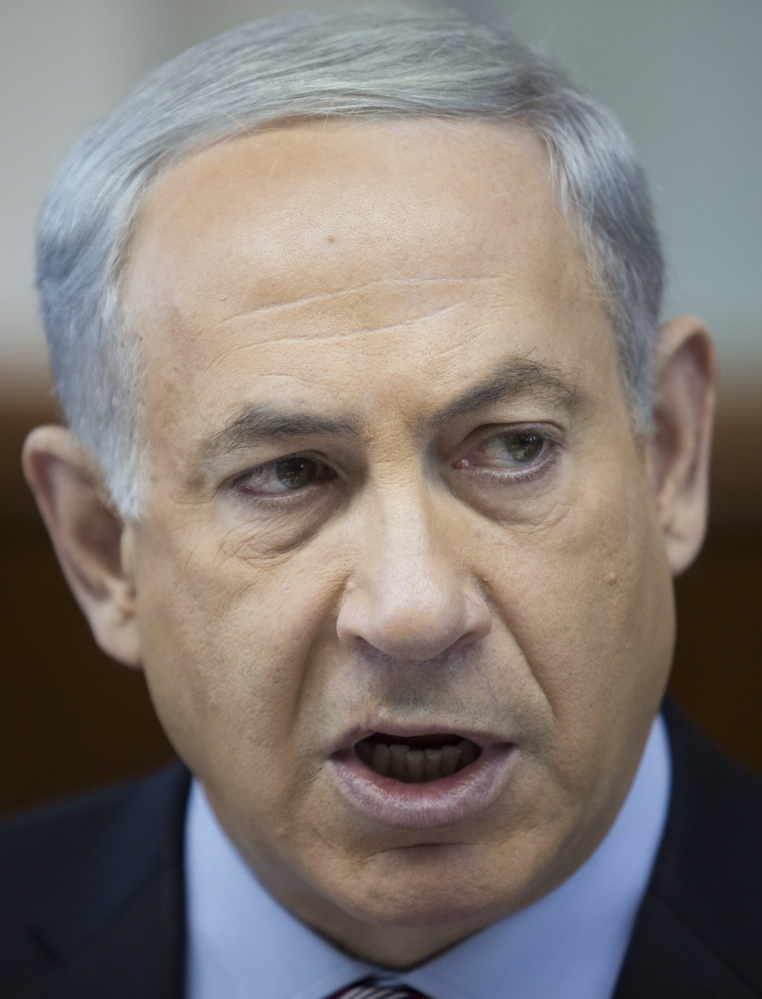Top Obama administration officials launched a major sales pitch Sunday aimed at marshaling public support for the framework agreement between Iran and several world powers over its nuclear program, even as Israeli Prime Minister Benjamin Netanyahu took to American airwaves to blast the accord.
The fight to shape public perceptions of the deal could have major implications for its survival, with congressional Republicans pushing for the right to accept or reject any final pact. The White House has already warned that the president would veto legislation the Senate Foreign Relations Committee is poised to take up this month that would withhold sanctions relief for Iran under the final deal until lawmakers had a 60-day period to review and vote on it.
Netanyahu appeared on three major networks – ABC, NBC and CNN – while Energy Secretary Ernest Moniz went on CBS’s “Face the Nation” and deputy national security adviser Ben Rhodes appeared on CNN’s “Fareed Zakaria GPS.” Multiple Republican and Democratic senators also delivered their assessments of the framework agreement – largely divided along party lines – on several Sunday shows.
Even before a deal was struck last week, the administration’s top negotiators had been preparing to defend any agreement from the political onslaught they knew it would face in the halls of Congress and in Jerusalem.
“We have blocked all of these pathways to a bomb, and we should also emphasize this is not a 10-year deal,” Moniz, one of the key negotiators, said on CBS. “This is a long-term arrangement.”
But Netanyahu called it “a historically bad deal” on NBC’s “Meet the Press,” suggesting it would lead to both a conventional and nuclear arms race in the Middle East.
“I think this deal is a dream deal for Iran and a nightmare deal for the world,” the Israeli leader said.
Netanyahu argued that the United States could have brokered a better deal and still has the option of doing so by ratcheting up the pressure of sanctions against Iran.
“I think that what they don’t accept today, they can accept tomorrow,” he said in an interview on ABC’s “This Week.”
Key Republican senators – including Foreign Relations Committee Chairman Bob Corker of Tennessee and Lindsey Graham of South Carolina – echoed that sentiment, saying they would work to alter any agreement by using the leverage they hold over lifting some of the sanctions now in place.
Graham called President Obama “a flawed negotiator” in an interview on CBS, adding that without the “baggage of Obama,” the next president – regardless of party – would be able to secure a stronger deal.
Corker identified multiple “red flags” in the framework agreement, including what elements would be considered before international sanctions on Iran are lifted and the uncertainty surrounding what process would be in place for the International Atomic Energy Agency to conduct inspections.
Still, the tentative agreement might have provided the administration with crucial breathing room by undercutting support among Democrats for legislation that could imperil further negotiations.
“The whole purpose of this exercise was to demonstrate progress in order to fend off congressional action,” said Gary Samore, a former nuclear arms adviser to Obama who is now the executive director for research at Harvard University’s Belfer Center for Science and International Affairs.
While several Democrats have also suggested that Congress should be able to vote any Iran agreement up or down – input Corker described Sunday as Congress’s “rightful role” – key lawmakers within the president’s party offered their support Sunday.
Sen. Dianne Feinstein of California, the top Democrat on the Senate Intelligence Committee, said on CNN’s “State of the Union” that the nuclear framework was “a better agreement, candidly, than I thought it was ever going to be” and that she would not support Corker’s bill in its current form.
Sen. Chris Murphy, D-Conn., noted on NBC that other sanctions – including over Iran’s ballistic missile program, the country’s support for terrorism and record on human rights – will remain in place even if the framework agreement is finalized. And he pushed back against the criticism that the deal does nothing to alter the behavior of a country Netanyahu repeatedly called the “preeminent terrorist state of our time.”
Copy the Story LinkSend questions/comments to the editors.




Success. Please wait for the page to reload. If the page does not reload within 5 seconds, please refresh the page.
Enter your email and password to access comments.
Hi, to comment on stories you must . This profile is in addition to your subscription and website login.
Already have a commenting profile? .
Invalid username/password.
Please check your email to confirm and complete your registration.
Only subscribers are eligible to post comments. Please subscribe or login first for digital access. Here’s why.
Use the form below to reset your password. When you've submitted your account email, we will send an email with a reset code.